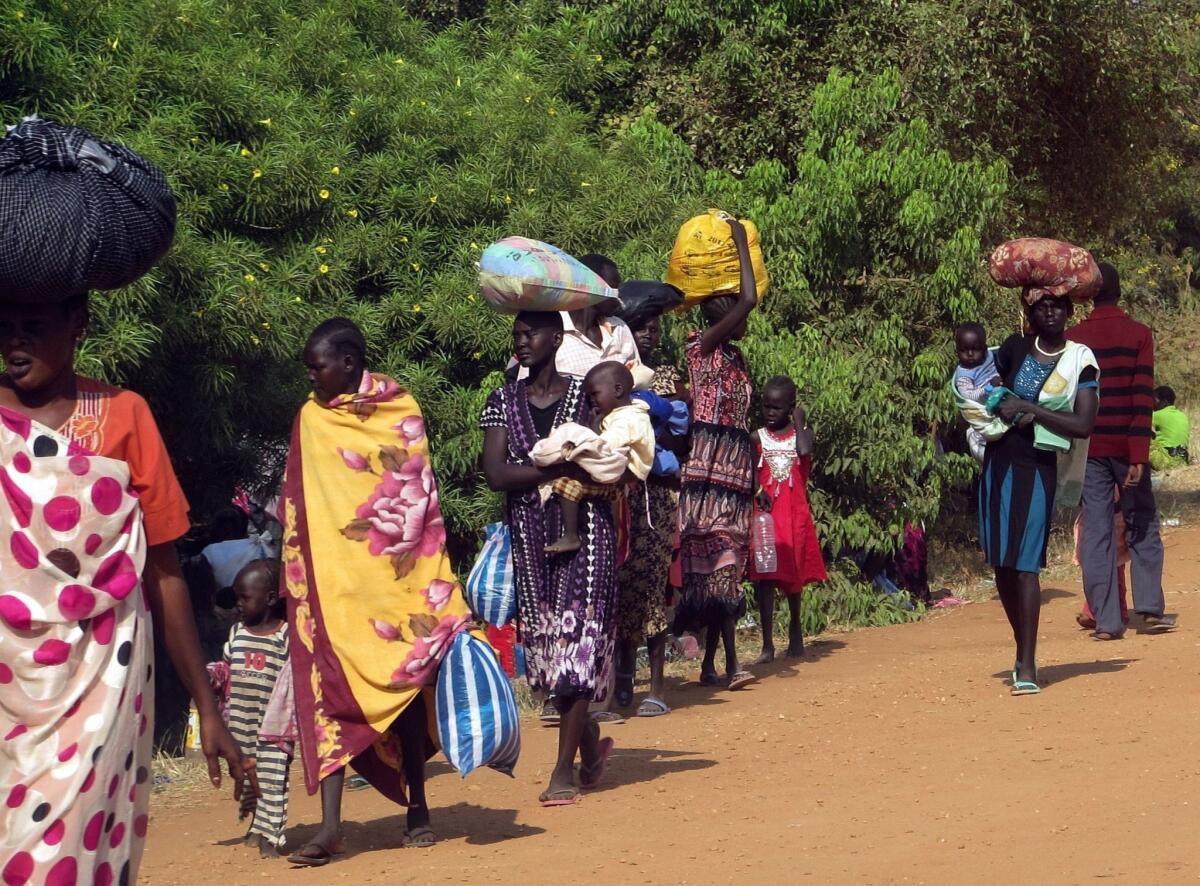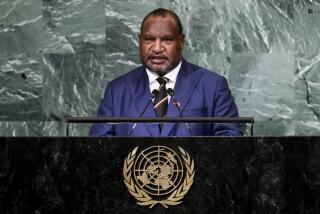Civilians take refuge as dozens killed in South Sudan violence

JOHANNESBURG, South Africa -- Dozens of soldiers were killed as clashes continued for a second day in the South Sudanese capital of Juba, as more than 13,000 civilians took refuge at a U.N. peacekeepers’ base.
The fragile state is confronting its greatest crisis since independence in 2011, after clashes erupted late Sunday and President Salva Kiir accused his rival and former deputy, Riek Machar, of launching a coup attempt.
Kiir swapped his trademark American cowboy hat for military fatigues when he made Monday’s television address. He had dismissed Machar as vice president in July, along with his entire cabinet, after a bitter power struggle in his ruling Sudan People’s Liberation Movement.
Mortar and heavy machine-gun fire were reported near the presidential palace while streets of the capital Juba remained deserted. As fighting continued in several neighborhoods, security forces raided Machar’s home but he remained at large. Five former ministers were arrested, according to government officials.
The U.S. Embassy’s Twitter feed confirmed heavy gunfire and urged people to remain indoors.
Underlying the conflict are simmering tensions between Kiir’s Dinka tribe and Machar’s Nuer tribe. The clashes initially broke out between rival factions in the presidential guard. Some fear that unless the violence is contained and the differences between the groups settled peacefully, the world’s newest state could slide into chaos.
The U.N. special envoy, Hilde F. Johnson, issued a statement Tuesday calling on all sides in the conflict to refrain from ethnic violence.
“As UNMISS [the UN mission] has previously warned against any hate speech in relation to inter-communal violence in South Sudan, it is paramount that the current violence does not assume ethnic dimensions,” she said. “At a time when unity among South Sudanese is needed more than ever, I call on the leaders of this new country and all political factions and parties as well as community leaders to refrain from any action that fuels ethnic tensions and exacerbates violence.”
Presidential spokesman Ateny Wek Ateny played down the ethnic aspect of the conflict, saying authorities were hunting for several coup plotters of Dinka ethnicity, not just Nuers.
South Sudanese Foreign Minister Barnaba Marial Benjamin told reporters on Tuesday that the army was carrying out raids to “clear out remnants” of the renegade soldiers loyal to Machar.
“Our forces are hunting them down but there should be no cause for alarm. The government is in full control,” he said, adding that Machar and others allegedly linked to the coup were still being sought.
“They are still looking for more who are suspected of being behind the coup,” Benjamin said.
Benjamin described the group of alleged plotters as “disgruntled” soldiers, who attempted an attack on the republican guard army barracks on Sunday night.
Toby Lanzer, U.N. humanitarian coordinator in South Sudan, tweeted that 13,000 people had fled the fighting and were in the UNMISS base or on Juba’s outskirts. He said at least 200 wounded were at Juba Teaching Hospital with more likely elsewhere.
There were conflicting reports on casualties, with up to 66 killed, AFP reported, citing a military doctor who spoke to local radio. Another hospital reported 26 dead.
“It’s been a difficult morning for all in South Sudan, especially civilians in parts of Juba who just need calm to get on with their lives,” Lanzer tweeted.
Juba’s airport, as well as the country’s borders with both Uganda and Kenya remained closed.
The office of U.N. General Secretary Ban Ki-moon said in a statement that he was “deeply concerned about reports of fighting between members of the [Sudanese military] in Juba and about the risk of targeted violence against certain communities.” He urged the country’s military leaders to “impose discipline on their forces and to exercise maximum restraint in the use of force.”
The U.S. is anxiously keeping a close eye on developments in South Sudan. “It is a very fluid situation. We’re going to keep monitoring that,” State Department spokeswoman Marie Harf said.
The U.S. special envoy to Sudan and South Sudan, Donald Booth, said that the U.S. is not ready yet to call what happened a coup, and that much remains unclear.
The government of South Sudan has been beset by crises since independence, including tension over the sharing of oil revenue with Sudan, which saw oil production shut down for 15 months; a refugee crisis in the north of the country, after people fled war in the south of Sudan; and repeated tribal clashes in eastern South Sudan.
The government has struggled to provide services and bring rampant corruption under control.
Staff writer Dixon reported from Johannesburg and special correspondent Hassan from Cairo.
More to Read
Start your day right
Sign up for Essential California for news, features and recommendations from the L.A. Times and beyond in your inbox six days a week.
You may occasionally receive promotional content from the Los Angeles Times.






